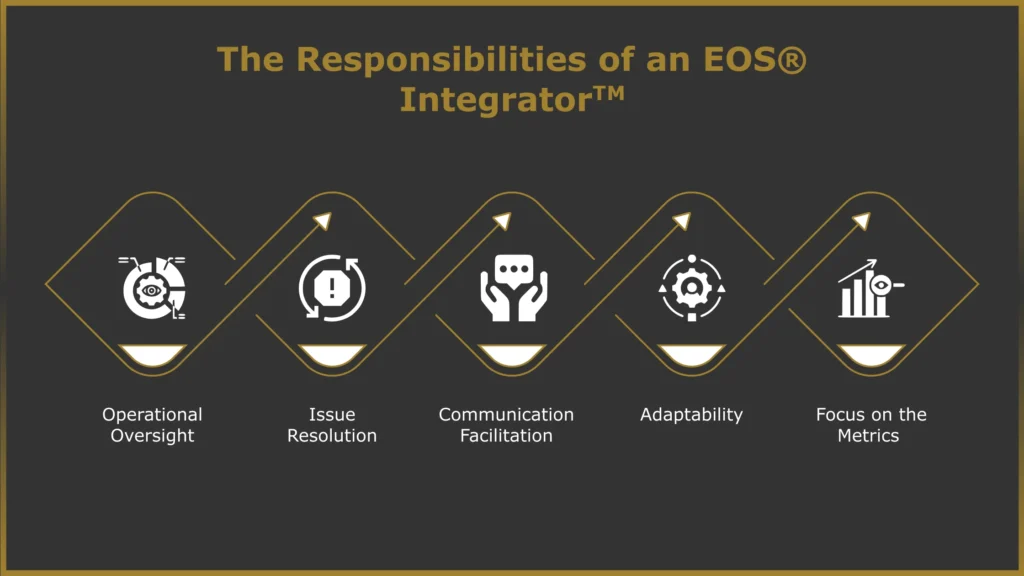My strategic goals aren’t translating into daily execution.
I do have a clear vision. I’m curious why my operations still feel chaotic!
Even though we have all the project management tools in place, my team is unsure of the direction, and accountability is a hit or miss!
As a business owner, if these are your trail of thoughts, you’re not the only one. These challenges are common, so over 13,000 companies have adopted the Entrepreneurial Operating System (EOS) to create structure and efficiency.
One significant role in this system is the EOS Integrator, a leader responsible for ensuring that business objectives translate into measurable results. They align teams, create accountability, and ensure things get done. Without one, even the best companies can stall. With the right Integrator in place? The results can be transformative.
So, let’s talk about what an EOS Integrator does—and why your business might need one.
What Is an EOS® IntegratorTM?
|
An EOS® IntegratorTM is a leader who ensures a business runs smoothly by turning strategic goals into real-world execution. Within the Entrepreneurial Operating System (EOS)® framework, this role manages operations, creates accountability, and keeps teams aligned. While the Visionary focuses on big-picture thinking and long-term growth, the Integrator ensures the company follows a clear, structured path to achieve those goals. |
The Integrator leads leadership meetings, resolves issues, and ensures different departments work together effectively. They enforce priorities, maintain consistency, and eliminate operational bottlenecks that slow progress. Without an Integrator, businesses often face miscommunication, stalled projects, and a lack of follow-through. With the right Integrator in place, execution becomes seamless, teams stay focused, and growth happens more efficiently.
The Difference Between a VisionaryTM and an IntegratorTM
In an EOS-run business, success depends on two distinct but equally important roles: the Visionary and the Integrator. While both are leaders, their responsibilities and strengths are entirely different. Understanding the difference between these roles is crucial for building a high-performing organization.
A Visionary is typically the founder or CEO who sees the company’s future and drives big-picture strategy. They thrive on innovation, ideas, and long-term goals. Visionaries are often creative problem-solvers who spot opportunities and inspire others. However, they struggle with day-to-day execution, follow-through, and operational structure.
An Integrator, on the other hand, is responsible for turning those ideas into action. They manage operations, align teams, and ensure accountability. Integrators bring order to the chaos, enforce priorities, and make sure that great ideas don’t just stay on paper but get implemented.
The Responsibilities of an EOS® IntegratorTM

An EOS Integrator keeps a business running efficiently by aligning goals, processes, and teams. Their responsibilities cover multiple aspects of business operations, aiming to create structure and drive execution.
Operational Oversight
An Integrator ensures that daily operations run smoothly. They manage major business functions, oversee department leaders, and enforce accountability. They focus on maintaining efficiency and ensuring that teams execute tasks aligned with company goals.
Issue Resolution
Problems and roadblocks are inevitable, but an Integrator is there to solve them before they derail progress. They identify operational bottlenecks, mediate conflicts, and implement solutions that keep the company moving forward. Rather than letting challenges pile up, they address them decisively.
Communication Facilitation
An Integrator bridges the gap between different teams and leadership. They ensure everyone is aligned, messages are clear, and priorities are understood across the organization. Maintaining open communication channels prevents misunderstandings and keeps teams working cohesively.
Adaptability
Businesses grow, and an Integrator must be able to pivot when necessary. Whether it’s adjusting processes, refining strategy, or addressing market shifts, they ensure that the company remains flexible while staying true to its core objectives. Their ability to adapt helps the business navigate change effectively.
Focus on the Metrics
A strong Integrator doesn’t just ensure things get done—they ensure the right things get done. They track key performance indicators (KPIs), measure progress, and use data-driven insights to guide decision-making. Their role is to maintain focus on measurable outcomes rather than just activity.
With these responsibilities, an EOS Integrator becomes the backbone of execution, making sure that vision turns into measurable, sustainable growth.
Traits of an Effective EOS® IntegratorTM
Not everyone is suited for the role of an EOS Integrator. This position requires a unique blend of leadership, strategic thinking, and problem-solving. The best Integrators don’t just manage operations—they bring clarity, accountability, and stability to an organization. Here are the essential qualities that define a strong EOS Integrator:
- Natural Leadership – Commands respect and guides teams with confidence.
- Commitment to the Organization – Prioritizes the company’s success above personal interests.
- Comfort with Uncertainty – Navigate challenges with composure and adaptability.
- Fact-Driven Decision-Making – Focuses on data and logic rather than emotions.
- Big-Picture Thinking – Understands how every decision affects the overall business.
- Effective Delegation – Empowers the leadership team and optimizes efficiency.
- Confidence with Humility – Leads with assurance while remaining open to feedback.
- Pragmatic Approach – Finds realistic, actionable solutions to complex problems.
How Does a High-Performing EOS® IntegratorTM Impact Business?

A high-performing EOS Integrator is more than just an operational leader—they are the force that transforms chaos into clarity, misalignment into momentum, and strategy into execution. Businesses that embrace an exceptional Integrator experience measurable improvements in efficiency, team performance, and bottom-line results. Here’s how:
1. Stronger Execution and Accountability
Without clear accountability, even the best strategies remain ideas rather than actions. A high-performing Integrator ensures that plans don’t just sit on a whiteboard but are executed precisely. They:
- Define clear priorities and objectives for teams.
- Hold leaders accountable for results.
- Ensure that goals are met on schedule.
This leads to a culture of ownership, where every team member understands their role in driving the business forward.
2. Improved Operational Efficiency
Inefficiencies drain time, money, and morale. A significant Integrator streamlines operations and achieves operational efficiency by:
- Implementing systems and processes that reduce redundancy.\
- Eliminating bottlenecks that slow down decision-making.
- Aligning resources to maximize productivity
The result? A company that runs smoother, wastes less, and achieves more.
3. Enhanced Team Alignment and Communication
Lack of alignment between departments can lead to silos, misunderstandings, and missed opportunities. An Integrator serves as the central link, ensuring that:
- Communication flows effectively between leadership and teams.
- Everyone understands company goals and their role in achieving them.
- Departments work together rather than operating in isolation.
With an Integrator in place, the entire organization moves in sync, avoiding costly miscommunication and inefficiencies.
4. Increased Profitability and Growth
When businesses are disorganized, revenue potential is often left untapped. A high-performing Integrator drives profitability by keeping the company focused on the most impactful activities, optimizing financial resources to reduce unnecessary costs, and ensuring teams execute in a way that leads to sustainable growth.
An Integrator helps businesses grow faster and more predictably by turning strategic plans into measurable results.
5. More Freedom for the CEO and Leadership Team
Many business owners and executives are caught up in day-to-day operations instead of focusing on long-term strategy. A strong Integrator allows leadership to:
- Step away from operational firefighting.
- Focus on innovation, partnerships, and high-level decision-making.
- Work on the business rather than in the business.
Do You Need an EOS® IntegratorTM? 5 Questions To Help You Decide
Hiring an EOS Integrator is a crucial decision. The right Integrator brings structure, accountability, and execution to a business, helping it scale efficiently. But how do you know if your organization is ready? These five questions will help you determine if an Integrator is the missing piece in your company’s success.
1. Am I uncomfortable being challenged for the greater good of the business?
An Integrator’s role is to drive execution, sometimes making tough calls and pushing back on decisions that aren’t aligned with the company’s best interests. An Integrator might feel disruptive if you prefer a team that simply follows instructions without questioning. However, if you’re open to being challenged in a way that strengthens the business, you’re likely ready for this role.
2. Do we need better processes and systems?
If your company operates without transparent processes, relies too much on verbal instructions, or frequently deals with inefficiencies, an Integrator can help. They bring structure by implementing repeatable systems, ensuring that departments work cohesively. Businesses struggle with inconsistent results and wasted resources without a strong operational backbone.
3. Are my people disappointed with our communications?
Miscommunication slows progress, creates confusion, and lowers morale. If teams frequently misunderstand priorities, lack clarity in expectations, or struggle to get updates, an Integrator can bridge those gaps. They act as the communication hub, ensuring that messages flow effectively across the company and everyone is aligned.
4. Is there room for my team to execute at a higher level?
Even strong teams can perform better with the proper structure and leadership. If your business feels stuck or projects take too long to complete, an Integrator can improve execution. They provide clear priorities, track accountability, and ensure that teams are focused on the right objectives.
5. Do I struggle to maximize my leadership team’s full potential?
A leadership team is only as effective as its ability to execute. If you find yourself constantly putting out fires, handling operational tasks that should be delegated, or feeling frustrated with a lack of progress, an Integrator can step in. They create alignment, hold leaders accountable, and free you up to focus on strategic growth.
If you answered yes to most of these questions, your business is likely at a stage where an EOS Integrator is beneficial and necessary. The right Integrator helps turn vision into reality, ensuring operations run smoothly, teams stay aligned, and growth happens predictably. Hiring one could be the key to unlocking your company’s full potential.
Achieve Unparalleled Success with the Right EOS® IntegratorTM from Outcomes COO

A high-performing EOS Integrator can be the difference between a company that struggles with execution and one that thrives with clarity, accountability, and sustainable growth. If you’re ready to bring structure to your business, improve efficiency, and free yourself to focus on the bigger picture, Outcomes COO is here to help.
With our experienced Fractional COOs, you gain all the benefits of a seasoned Integrator—without the long-term commitment of a full-time role. A Fractional EOS Integrator works part-time, bringing the same level of expertise and discipline but scaled to your company’s needs. This makes them a perfect fit for businesses that aren’t ready for a full-time hire but still need someone to drive execution, resolve issues, and keep the team aligned and moving forward.
- Stronger execution – Turning strategy into measurable results.
- Improved team alignment – Ensuring clear communication and accountability.
- Optimized operations – Eliminating inefficiencies and driving profitability.
- More freedom for leadership – Allowing you to focus on vision and growth.
Let’s build a stronger, more aligned organization—schedule a consultation today and take the first step toward operational excellence.

